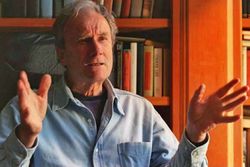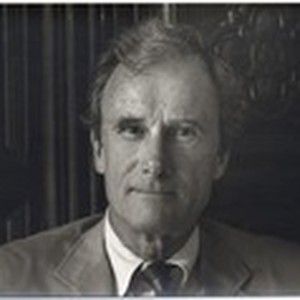Passionate historian of California
- Carl Nolte, Chronicle Staff Writer
Saturday, September 2, 2006
J.S. Holliday, one of the most eminent historians of California and the West, died at his home in Carmel on Thursday at the age of 82. He had been suffering from pulmonary fibrosis. Holliday was the author of "The World
Rushed In," a history of the California Gold Rush that was a best-seller when it was published in 1981; it went through 13 printings, and a new edition was reissued recently by the University of Oklahoma Press. Kevin
Starr, another noted historian of the West, called "The World Rushed In" "a classic." If it were only for the one book, Holliday's reputation as a historian would be secure, but he was also the founding director of the Oakland Museum of California and executive director emeritus of the California Historical Society, taught history at San Francisco State University, and served for a time as assistant director of the Bancroft Library at UC Berkeley. He also lectured, appeared on television and wrote articles on history. "No one writes better about California's irresistible past,'' said Ken Burns, the
television documentary expert. "I am a huge fan.'' "He was a towering figure in California history,'' said Gary Kurutz, principal librarian for special collections at the California State Library. "His death is a real loss.'' Holliday was born Jaquelin Smith Holliday II, June 10, 1924, in Indianapolis. His family was in the steel business, and young J.S. Holliday attended private schools. He seldom used his given name. His friends called him "Jim." Holliday attended midshipman school at Northwestern University
during World War II and served in the U.S. Navy as an officer aboard an escort aircraft carrier in the Pacific. He attended Yale University and graduated with a degree in history in 1948. At Yale, one of his teachers brought to his attention letters and a diary written by a man named William Swain, who set out from Michigan in 1849 with a group of adventurers called the Wolverine Rangers to
make his fortune in far-off California. In Swain, Holliday found his own mother lode. Swain's letters and diary -- his adventures traveling across the Great Plains, down the dreary Humboldt River in Nevada, his trek across
the Black Rock Desert, his life in the California Gold Country -- were the basis for "The World Rushed In.'' Holliday often said that the story of the Gold Rush -- which he said was the greatest peacetime mass migration in
history -- brought him to California. He moved West in 1949, on the 100th anniversary of the Gold Rush. "I came here for gold and found other ways of seeking success in California,'' he said. He got a doctorate in history
from UC Berkeley in 1958 and a research fellowship at the Huntington Library, then worked at the Bancroft and taught at San Francisco State. By then he had a considerable reputation as a forceful and vigorous exponent of
his views of history. "He was one of the most vital people I ever knew," said Joe Illick, who served with him on the faculty at San Francisco State. He was "a big, handsome, rumpled man with a passion for the rugged life,'' The Chronicle said of him when he had become well known. Early in his career, however, Holliday's passion for history did not always go down well with more sedate custodians of the state's past. In 1967, he was named the founding
director of what later became the much-praised Oakland Museum of California.
However, he was so forceful and uncompromising in his views that he was
fired just before the museum opened in 1969. He then became executive
director of the California Historical Society and organized a series of
major traveling exhibitions, including one about the internment of Japanese
Americans during World War II. "It caused quite a stir,'' said David
Crossen, the current executive director of the society. "People in
historical societies didn't deal with issues like that back then. He was a
model for the young Turks in historical
organizations.'' Holliday served two terms in the top job at the
California Historical Society. However, he always came back to the Gold Rush
book. He felt the 1849 Gold Rush was a seminal event in the state's history
that, in his words, "changed California, changed the whole West and changed
America's sense of itself.'' He wanted to present it in human terms, to make
the lives of the long-dead Forty-Niners come alive. It took him 30 years
to write. "He was such a careful writer that it sometimes took him a week
to get two paragraphs right,'' said Kurutz. "He was as thorough as can be.''
The result was what Starr called "a masterly narrative.'' The book won the
Silver Medal of the Commonwealth Club of California and the Oscar Lewis
Award for Achievement in Western History from the Book Club of California.
In 1999, Holliday wrote "Rush for Riches: Gold Fever and the Making of
California," which also received critical acclaim. Holliday was married
twice. His
first marriage, to Nancy Adams, ended in divorce. He was married to Belinda
Vidor Jones in 1983, and she survives him. He also leaves three children:
Timothy Holliday of New Orleans, Martha Brett Holliday of Farmington, Conn.,
and W.J. Holliday of Menlo Park. A memorial service is pending. E-mail
Carl Nolte at [email protected]. Page B - 1
URL:
http://sfgate.com/cgi-bin/article.cgi?file=/c/a/2006/09/02/BAGA0KU5DI1.DTL
George
Passionate historian of California
- Carl Nolte, Chronicle Staff Writer
Saturday, September 2, 2006
J.S. Holliday, one of the most eminent historians of California and the West, died at his home in Carmel on Thursday at the age of 82. He had been suffering from pulmonary fibrosis. Holliday was the author of "The World
Rushed In," a history of the California Gold Rush that was a best-seller when it was published in 1981; it went through 13 printings, and a new edition was reissued recently by the University of Oklahoma Press. Kevin
Starr, another noted historian of the West, called "The World Rushed In" "a classic." If it were only for the one book, Holliday's reputation as a historian would be secure, but he was also the founding director of the Oakland Museum of California and executive director emeritus of the California Historical Society, taught history at San Francisco State University, and served for a time as assistant director of the Bancroft Library at UC Berkeley. He also lectured, appeared on television and wrote articles on history. "No one writes better about California's irresistible past,'' said Ken Burns, the
television documentary expert. "I am a huge fan.'' "He was a towering figure in California history,'' said Gary Kurutz, principal librarian for special collections at the California State Library. "His death is a real loss.'' Holliday was born Jaquelin Smith Holliday II, June 10, 1924, in Indianapolis. His family was in the steel business, and young J.S. Holliday attended private schools. He seldom used his given name. His friends called him "Jim." Holliday attended midshipman school at Northwestern University
during World War II and served in the U.S. Navy as an officer aboard an escort aircraft carrier in the Pacific. He attended Yale University and graduated with a degree in history in 1948. At Yale, one of his teachers brought to his attention letters and a diary written by a man named William Swain, who set out from Michigan in 1849 with a group of adventurers called the Wolverine Rangers to
make his fortune in far-off California. In Swain, Holliday found his own mother lode. Swain's letters and diary -- his adventures traveling across the Great Plains, down the dreary Humboldt River in Nevada, his trek across
the Black Rock Desert, his life in the California Gold Country -- were the basis for "The World Rushed In.'' Holliday often said that the story of the Gold Rush -- which he said was the greatest peacetime mass migration in
history -- brought him to California. He moved West in 1949, on the 100th anniversary of the Gold Rush. "I came here for gold and found other ways of seeking success in California,'' he said. He got a doctorate in history
from UC Berkeley in 1958 and a research fellowship at the Huntington Library, then worked at the Bancroft and taught at San Francisco State. By then he had a considerable reputation as a forceful and vigorous exponent of
his views of history. "He was one of the most vital people I ever knew," said Joe Illick, who served with him on the faculty at San Francisco State. He was "a big, handsome, rumpled man with a passion for the rugged life,'' The Chronicle said of him when he had become well known. Early in his career, however, Holliday's passion for history did not always go down well with more sedate custodians of the state's past. In 1967, he was named the founding
director of what later became the much-praised Oakland Museum of California.
However, he was so forceful and uncompromising in his views that he was
fired just before the museum opened in 1969. He then became executive
director of the California Historical Society and organized a series of
major traveling exhibitions, including one about the internment of Japanese
Americans during World War II. "It caused quite a stir,'' said David
Crossen, the current executive director of the society. "People in
historical societies didn't deal with issues like that back then. He was a
model for the young Turks in historical
organizations.'' Holliday served two terms in the top job at the
California Historical Society. However, he always came back to the Gold Rush
book. He felt the 1849 Gold Rush was a seminal event in the state's history
that, in his words, "changed California, changed the whole West and changed
America's sense of itself.'' He wanted to present it in human terms, to make
the lives of the long-dead Forty-Niners come alive. It took him 30 years
to write. "He was such a careful writer that it sometimes took him a week
to get two paragraphs right,'' said Kurutz. "He was as thorough as can be.''
The result was what Starr called "a masterly narrative.'' The book won the
Silver Medal of the Commonwealth Club of California and the Oscar Lewis
Award for Achievement in Western History from the Book Club of California.
In 1999, Holliday wrote "Rush for Riches: Gold Fever and the Making of
California," which also received critical acclaim. Holliday was married
twice. His
first marriage, to Nancy Adams, ended in divorce. He was married to Belinda
Vidor Jones in 1983, and she survives him. He also leaves three children:
Timothy Holliday of New Orleans, Martha Brett Holliday of Farmington, Conn.,
and W.J. Holliday of Menlo Park. A memorial service is pending. E-mail
Carl Nolte at [email protected]. Page B - 1
URL:
http://sfgate.com/cgi-bin/article.cgi?file=/c/a/2006/09/02/BAGA0KU5DI1.DTL
George
Family Members
Sponsored by Ancestry
Advertisement
Advertisement








